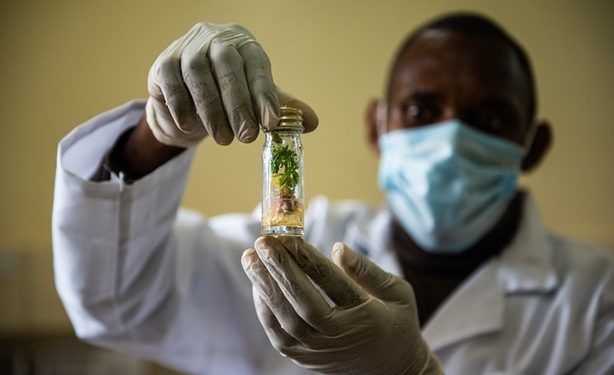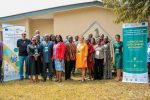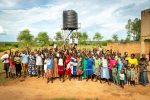Bridging the Gap: Linking University Research Prototypes to Viable Markets

Agricultural research is often criticised for being abundant, yet it sometimes fails to translate into practical applications that impact famers realities, as much of it lays archived in journals. Ruttoh Onesmus, a Product Research and Development Consultant, underscores this issue, stating, “Without market integration, research innovation is just a theory.” Recognising this challenge, RUFORUM aims to bridge the gap between research and real-world applications.
A noteworthy initiative in this regard is the Commercialisation of Academic Research Initiative (CARI) project, launched in 2023 with the backing of the Government of Uganda through the Science, Technology, and Innovation Secretariat at the Office of the President (STI-OP). CARI aims to assist universities in supporting staff and students to launch and scale research initiatives with market potential, thereby addressing the dual challenges of high unemployment among graduates and the demand for innovative agricultural solutions. This project is implemented in partnership with Busitema University, Islamic University, Makerere University, Mbarara University of Science and Technology and Nkumba University.
RUFORUM acknowledges that research and innovation are increasingly important for policy reform, development, and knowledge production. Therefore, it is crucial to position Universities to support this transition and ensure that research prototypes are commercialised.
Under CARI, RUFORUM has launched a pilot with the aforementioned universities to develop research products and services deploying fourth industrial revolution technologies in the agri-food and education sector. It has sensitised universities on the necessary policies, processes and stakeholder engagement required for mass commercialisation of research-derived products and services. Furthermore, RUFORUM launched a call for prototypes from 20th March to 30th April 2024, selecting five competitive prototypes with market potential. These prototypes are currently being incubated and prepared for market readiness.
To advance the project’s momentum, RUFORUM hosted a lesson-sharing and learning meeting at Busitema University on 24th April 2025. The event brought together principals and deans from faculties/schools of Engineering, Science, Information and Communication Technology, Agriculture, Environment and Natural Resources to share challenges and opportunities in supporting CARI research beneficiaries and to develop a roadmap for enhancing the commercialisation of academic research products.

RUFORUM staff with Busitema University management and CARI research beneficiaries
Through illustrative presentations, Busitema University shared some successful undertakings in implementing the CARI project, such as developing the Technology Business Incubation and Innovation Centre (TBIIC) to support staff and student innovations. The integration of entrepreneurship training into the curricula and partnership with private agribusinesses to co-develop and fund prototypes were highlighted. Importantly, the university secured government funding to prototype and scale research initiatives.
In a notable achievement, Busitema University identified eight innovations for commercialisation, with varying levels of market readiness, and successfully registered ten trademarks, namely:
1.GLUCOTAK HERBAL REMEDY
A treatment for Diabetes.
This herbal medication is derived from traditional natural plants and is intended to treat diabetes in patients. The Busitema University Research and Innovation Fund (BURIF) provided the initial funding for the prototype. However, it has secured additional funding from STI-OP to facilitate its standardisation and commercialisation.
2. PROVIRID
Remedy for HIV/AIDS Management.
The BURIF provided funding for the innovation, which progressed from a research concept to a prototype. However, STI-OP continued to provide funding for product development and standardisation.
3. TAZCOV
A therapeutic herbal medicine for the treatment of respiratory infections.
This prototype was funded by STI-OP for standardisation and commercialisation.
4. HERICOP SOAP
Traditional plants are used to produce this herbal detergent for cleansing the skin and treating skin infections.
This prototype was funded by BURIF for commercialisation.
5. ECODRYVE
Solar dryer for food and fruits for preservation.
This prototype was funded by BURIF and is ready for commercialisation but lacks funds for upscaling and testing for effective operation.
6. MOTORCYCLESPRAYER
A Biopesticide for pest management.
This prototype is funded by BURIF and is ready for commercialisation.
7. BUNUTSTRIPER
Harvesting, drying, curing and storage of ground nuts.
This prototype is funded by BURIF and is ready for commercialisation.
8. TRYCHOS
An organic bio-fertilizer applied to food plants to reduce fungal and aflatoxin levels, making them suitable for human consumption.
STI-OP has recently provided funding for commercialisation, in addition to the BURIF fund.
9. Fresh Juicy
The harvesting and processing of mangoes from local farms into juice.
This prototype is funded by BURIF and is ready for commercialisation.
10. BUMPAFCM
The process of expediting animal feed preparation by trimming forage for farmers.
This prototype is funded by BURIF and is ready for commercialisation.
Despite considerable challenges that impede scalability, such as funding gaps, limited awareness of Intellectual Property (IP) rights, and barriers to market access, the demand for localised solutions is growing. Climate-smart agriculture, for instance, is gaining traction as a critical area of development. In response, government and private sector support are creating pathways for commercialisation that universities and researchers can tap into.

Faculty staff at Busitema University
As Uganda continues to build its science, technology and innovation ecosystems, initiatives like CARI offers hope in scaling research into tangible benefits for the economy and society.






